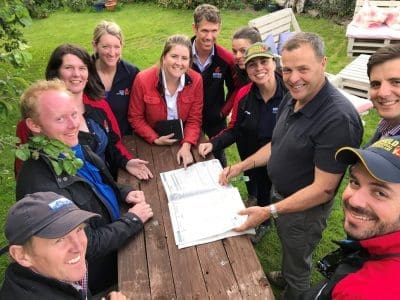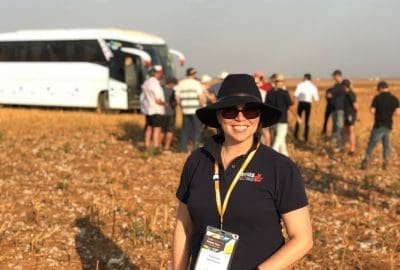This week’s Federal Budget boost to soil health is a step in the right direction, says Western Australian farmer and natural resource management leader Johanna Tomlinson.
Johanna said the announcement of $197 million over four years to start implementing the National Soil Strategy had been welcomed by farmers, particularly in south-west WA where soil health – particularly soil acidification – is a major concern.

Johanna Tomlinson (green hat) with her Nuffield colleagues in Ireland in June 2019. The 2019 China Global Focus Program group met with Irish Scholar, John Finlay, to discuss the impact of Brexit on the Irish beef industry. Click on image for a larger view
“Underperforming soils already cost Australian farmers billions of dollars, and expectations from consumers, customers, investors and regulators to demonstrate how we care for our soils are growing,” Johanna said.
“This funding could help the agriculture industry better understand, protect and improve our soils, and ensure agriculture can meet future challenges.”
Johanna and her husband Wayne run a mixed farm based on beef cattle, sheep, crops and fodder. Their beef operation supplies to export processor, Harvey Beef.
As part of a Nuffield Scholarship in 2019, she travelled to the Americas, Asia and Europe to understand soil health research and best management practice adoption globally. Her insights and recommendations for industry and government are captured in a Nuffield Australia report released today, made possible with the support of CBH Group.
Johanna focused on the issue of soil acidification because it is one of the biggest soil health challenges in her South Coast region of WA. It’s also a challenge for other large areas of WA and New South Wales, and about half of Australian agricultural land is at risk.
Soil acidity can limit crop and pasture choice, production and profitability. Throughout Johanna’s travels, she found consensus on the most cost-effective way to manage it: apply lime.
“So the question then became, how can industry and government support farmers to adopt best practice management.”
She said growers needed more localised knowledge and proof to demonstrate the return on investment on buying and applying lime.
“Our local grower and natural resource management groups have a huge role to play, and I feel that they need more support to amplify their impact.”
One way that governments could support farmers and local groups was by funding more long-term research sites focused on soil health.
“We need to see best management practices working in our local areas. But addressing soil health needs long-term vision, beyond government timeframes,” Johanna said.
“There are positive signs that government is recognising and taking action on soil health. That includes funding the Cooperative Research Centre for High Performance Soils (Soil CRC), as well as funding to implement the National Soil Strategy.
“I was really pleased to see investment flagged in the Federal Budget for monitoring and evaluation of soil health,” Johanna said.

Johanna Tomlinson in Mato Grosso, Brazil, as part of her travels with 2019 Rabobank Grains Tour team.
She also welcomed the Western Australian Soil Health Strategy that is under development, and looks forward to seeing its implementation plan that is anticipated by the middle of next year.
Johanna draws from her travels and experience as a farmer and Chief Operating Officer at the South Coast Natural Resource Management Inc to recommend the development of a soil health platform to engage farmers.
“The platform would consolidate current soil health information sources, and make that information easy to access and engaging. It would promote learning and sharing to improve soil health across industry.”
She said to ensure continual improvement, the national and state soil health strategies needed to be underpinned by effective and transparent monitoring and evaluation.
“I’m excited to see the focus on soil health and it’s the right time to work together to grow soil health. If you look back to the 1990s, there was a huge campaign ‘Time for Lime’ that was heavily supported by local research and development including a lot of extension programs. But that’s 20 to 30 years ago, and we need to revisit soil health support at that same scale.”
“I’m excited to see a lot of work in this space, I think the tide is turning.”
Johanna said work was also underway in the private sector. She pointed to the first soil carbon project for carbon credits registered in WA. The project is spearheaded by Harvey Beef, to which Johanna and husband Wayne supply cattle.
- Nuffield Australia awards up to 20 scholarships to people like Johanna every year. Find out more and apply at www.nuffield.com.au
Source: Nuffield
